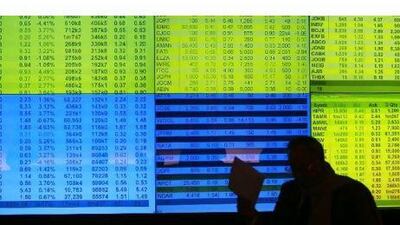In my experience as a wealth manager, there are two types of investors: those who focus on growth or, more advisedly, risk-adjusted growth, and those who focus on costs.
The sensible thing, of course, is to look at the difference between the two because that is what you are left with. That is what you can spend. Who cares what the costs are when the underlying investment is making you a lot of money? But when markets are performing badly, costs become the focus of everybody's attention.
If costs and, in particular, fund-management charges are a significant source of irritation to you, then you should take a look at exchange-traded funds (ETFs).
An ETF is an investment vehicle that is constructed like a mutual fund, but trades like an individual security on a stock exchange. The principle advantages of an ETF include low costs; transparency with regard to portfolio holdings, performance and costs; diversification potential through access to a wide range of asset classes; and efficiency because they can be sold and bought simply and quickly.
Most ETFs are designed to track specific indices such as the MSCI Emerging Market equity index or the FTSE 250 equity index. Importantly, they can also give an investor exposure to a wide range of other asset classes including fixed income, commodities, hedge funds and property.
And, because they combine the best features of index funds with those of individual company stocks, they enable an investor to take full control of his or her investment portfolio by spreading investments efficiently and cost effectively over an extensive range of asset classes.
The growth of the ETF industry over the past few years has been phenomenal. Since the launch of the first one in 1993, the industry has grown to more than US$1.3 billion (Dh4.7bn) of assets under management with nearly 2,500 different ETFs available.
An ETF is a type of index-tracking fund that aims to mirror the performance of an underlying index. If the index goes up 10 per cent in a year, then the corresponding ETF should rise by 10 per cent, minus the management charges of the ETF. They are consistently cheaper than traditional mutual funds and index-tracking funds.
According to iShares (a major supplier of ETFs), the average equity ETF in Europe has a total expense ratio (TER) of only 0.4 per cent per annum. This compares with 0.82 per cent per annum for a tracker funds and 1.77 per cent a year for an actively managed mutual fund.
Managing risk in an investment portfolio requires detailed knowledge of the asset classes in which your money is invested. Being in the right asset class, be it government bonds, large cap equities, gold or emerging-market debt, is far more important than choosing the best fund manager.
When gold and oil prices were rising rapidly last year, it did not matter much if either JP Morgan or HSBC were managing your fund. What mattered was whether or not you had chosen to be exposed to gold and oil rather than, for instance, government bonds.
The problem with many mutual funds is that it is not always easy to know precisely how your money is invested and therefore it is difficult to accurately determine your total asset allocation. This is much less of a problem with ETFs, where there is more transparency.
Although ETFs are more flexible than traditional funds, their shares cannot be bought from or sold back to the fund company. Investors can only buy or redeem shares directly from the fund company in 50,000-share blocks. And you don't get cash when you redeem your shares, you get the underlying stocks.
In practice, this means that only institutions deal directly with the ETF companies. The rest of us have to use a broker or buy from a portfolio bond, a fund platform or an online trading facility.
One key advantage that ETFs have over traditional mutual funds is trading flexibility. ETFs trade throughout the day, so you can buy and sell them when you want. However, the arbitrage mechanism that keeps the ETF price in line with the net asset value of the underlying index is not fail safe. This means that situations can arise where the ETF trades at a discount to the index. However, such events are rare and any discounts that arise are likely to be much smaller than investors are used to seeing with investment trusts, for example.
Because they are shielded from investor trading, ETFs do not have to keep cash on hand to meet redemptions, or be forced to sell stocks into a declining market for the same purpose. This allows ETF managers to run their portfolios extremely efficiently.
ETFs have a lot to offer. They are flexible and low cost, and their underlying portfolios are protected from the impact of investor trading, making them more efficient to manage than traditional unit trusts or mutual funds.
But investors should take note that an ETF is simply a vehicle for allowing investment in a chosen asset class. The choice of the asset class, or mix of asset classes, is far more important to you, as an investor, than the delivery system.
Bill Davey is a wealth manager at Mondial-Dubai. If you have any questions about this column or any other financial matter, e-mail him at bill.davey@mondialdubai.com.

